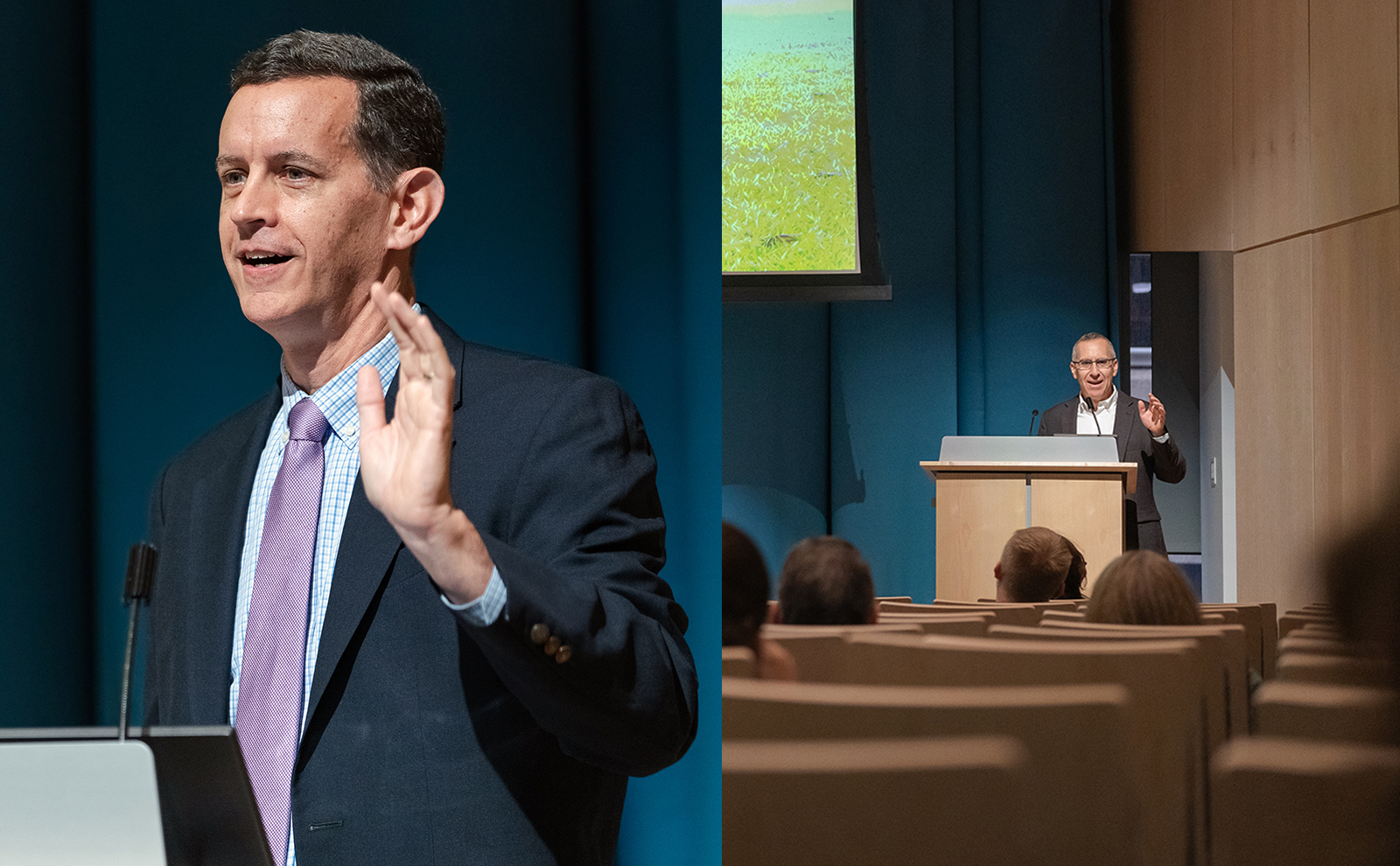
Bill Mallon (left) and Mike Boninger (right)
Pitt’s first observance of One Health Day, an international, transdisciplinary forum on global health, featured a presentation by William T. Mallon, senior director of strategy and innovation development at the Association of American Medical Colleges (AAMC), who serves as the point person for sustainability and climate action.
Speaking in the auditorium of Alan Magee Scaife Hall on Nov. 15, Mallon said that AAMC works with the nation's 159 medical schools that grant MDs and about 400 teaching hospitals and about 90 academic societies.
Among those, he said, the University of Pittsburgh School of Medicine was the first school in the country to appoint an associate dean for sustainability, Michael Boninger, Distinguished Professor of Physical Medicine and Rehabilitation.
“Your structure is particularly interesting to me because, as Mike mentioned earlier, he also wears the hat of being the chief medical sustainability officer for UPMC. And everywhere I go, I tell people about the Pitt model of integrating those components through one individual and the great team that works with him,” Mallon said.
He explained that the intersection of sustainability and health is a two-part problem.
“The World Health Organization called climate change the single biggest health threat facing humanity, a statement they made in the middle of the pandemic. So that's saying something. Projections indicate that climate change will cause approximately 83 million cumulative excess deaths by 2100,” he said.
Paradoxically, health care itself is a major contributor.
“Researchers estimate that the health sector is responsible for 8 to 10% of carbon pollution in the United States and a quarter of all global health care carbon pollution,” Mallon said. “If the U.S. health sector were a country, we would emit more carbon pollution than the United Kingdom. Policy makers and thought leaders have caught on, and they are putting pressure on the health sector to reduce its greenhouse gas emissions.”
The bulk of the emissions come from the health care supply chain: the production, transport, use and disposal of goods and services the sector consumes, he said.
“So we have a great irony: Health care organizations, in general, and academic health systems in particular, with missions of protecting and promoting health, are major climate polluters. Climate pollution leads to poor health outcomes. The fact that our health systems are emitting carbon pollution in service of making people healthy is a contradiction we've got to confront.”
But Mallon said he finds reasons for optimism in all the efforts he sees to make a difference, through areas including thought leadership, grassroots movements and progress in academia. He encouraged students and faculty members to explore AAMC’s open-access journal on teaching and learning innovations in the health professions, MedEdPORTAL, which just released a new climate and health education collection of peer-reviewed curricular materials. The call for submissions to the collection is here: Climate Change and Health Call for Submissions.
The event also featured a lively interdisciplinary presentation on preventing heat stroke, led by Noe Woods, assistant professor of obstetrics, gynecology, and reproductive sciences and assistant dean for sustainability, School of Medicine. Participants included physicians Joe Suyama and Amanda Artsen from the School of Medicine; Michelle Varnell of the School of Health and Rehabilitation Sciences (SHRS); Claire Werner of the School of Dental Medicine and Karen Pater from the School of Pharmacy. Students playing roles included Ainsley Lederer, a doctoral pharmacy student; Nathan Schneider, a PhD student in the School of Medicine; Karensa Tjoa, School of Medicine; and two undergraduate environmental science students, Molly Dinger and Randy Leidl.
The event culminated with the announcement of the following awards:
Sustainable Healthcare Challenge Winners
Each project received $40,000 in funding and one year of project manager support from CTSI to implement their idea. Funding was from the Mascaro Center for Sustainable Innovation, Clinical and Translational Science Institute, and School of Medicine.
-
Reducing Operating Room Waste and Cost Using AI, led by Peter Rubin and Hooman Rashidi
-
Additively Manufactured Sustainable Filters for Healthcare Applications, led by Markus Chmielus, Ian Nettleship and Bryan Brown
-
Optimizing STAT Medevac Dispatch for Fuel Efficiency and Carbon Footprint Reduction, led by Natasa Vidic and Jayant Rajgoopal
-
Development of a Reusable Pulse Oximeter Prototype Functional in Clinical Settings, led by Isabela Angelelli, Kevin Bell, and Brandon Barber
Student Research Presentation Winners ($250 gift card each)
-
Greenhouse Gas Inventory and Targets by Neeha Kolli
-
Evaluating the Impact of Interfacility Helicopter Transport Times on Patient Outcomes with an Eye Toward Sustainability by Justin Wang
Student Poster Competition Winners ($250 gift card each)
-
Education Poster: Reducing Food Waste in Health Care by Neha Devineni, Brandon Sia, Jenny Snyder and Mary Lazaris
-
Research Poster: Reducing Single-use Plastic Waste in Healthcare by Nnenna Ekoh
Student Research Funding ($2,500)
-
Eco-Engineering the Future: Sustainable Prosthetics for Sustainable Healthcare by William Schuck, Max Chiang, Marissa Varshine, Peter Vassil and Ellie Velasquez, with faculty mentor Goeran Fielder (SHRS).
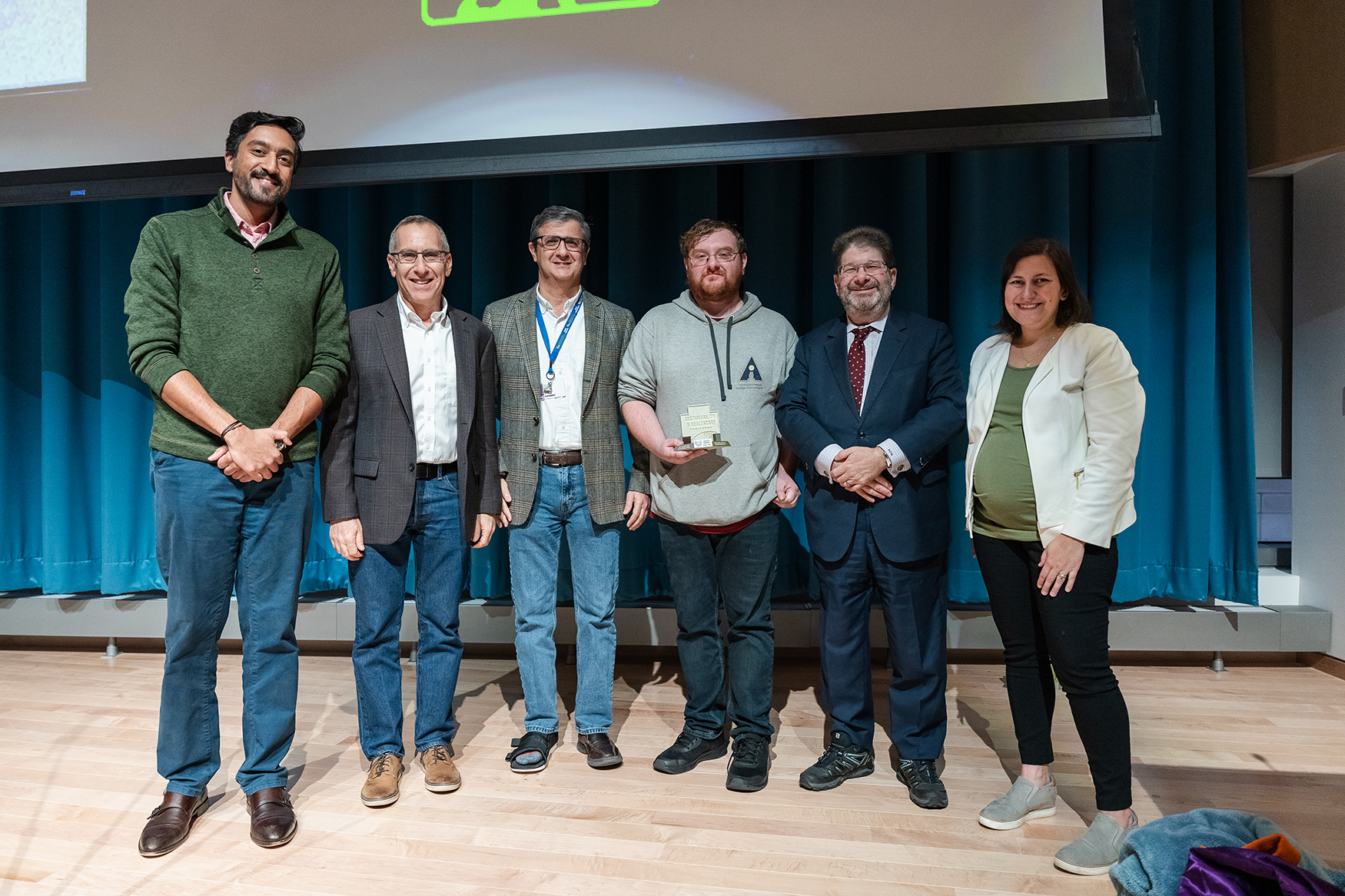
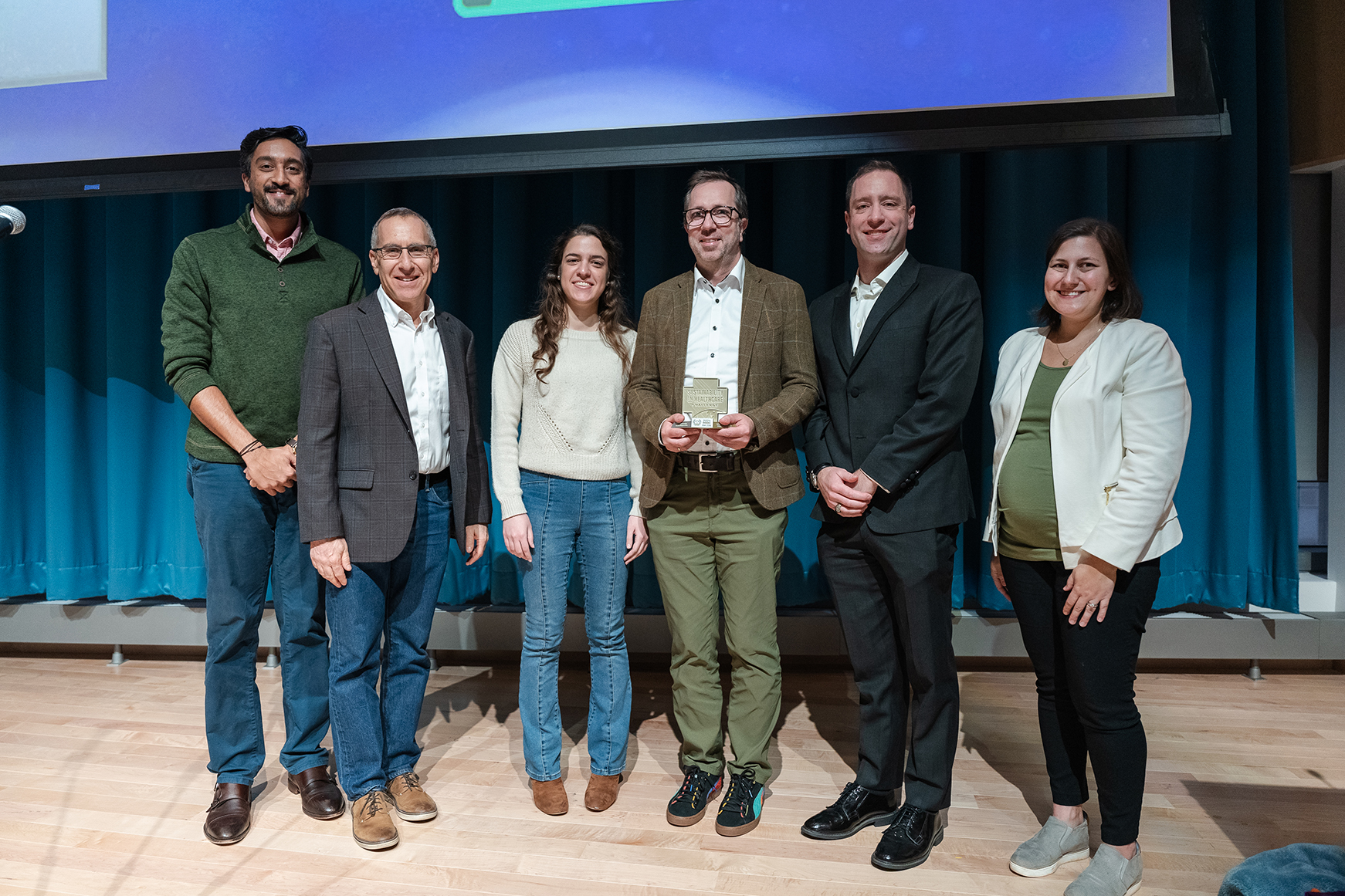
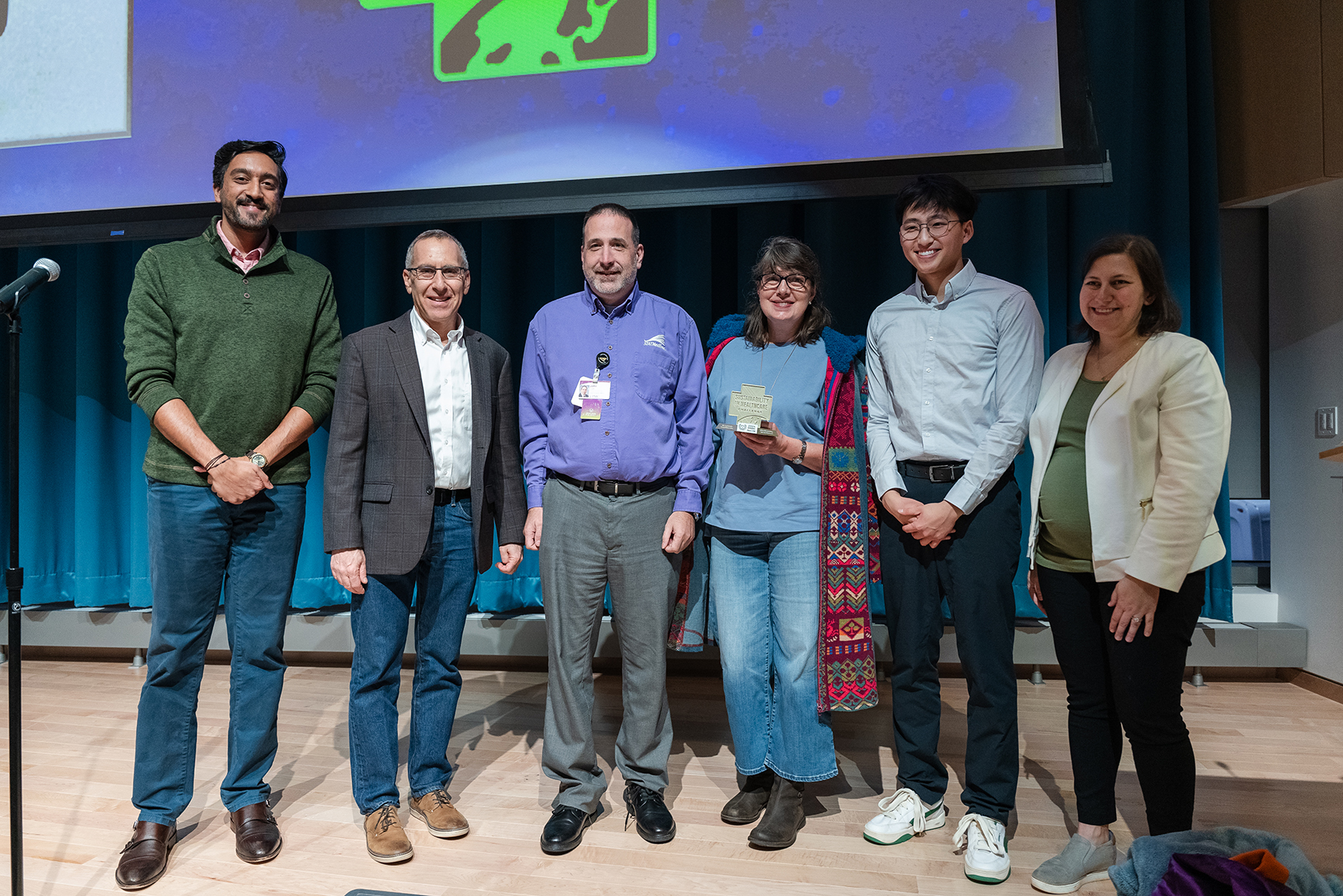
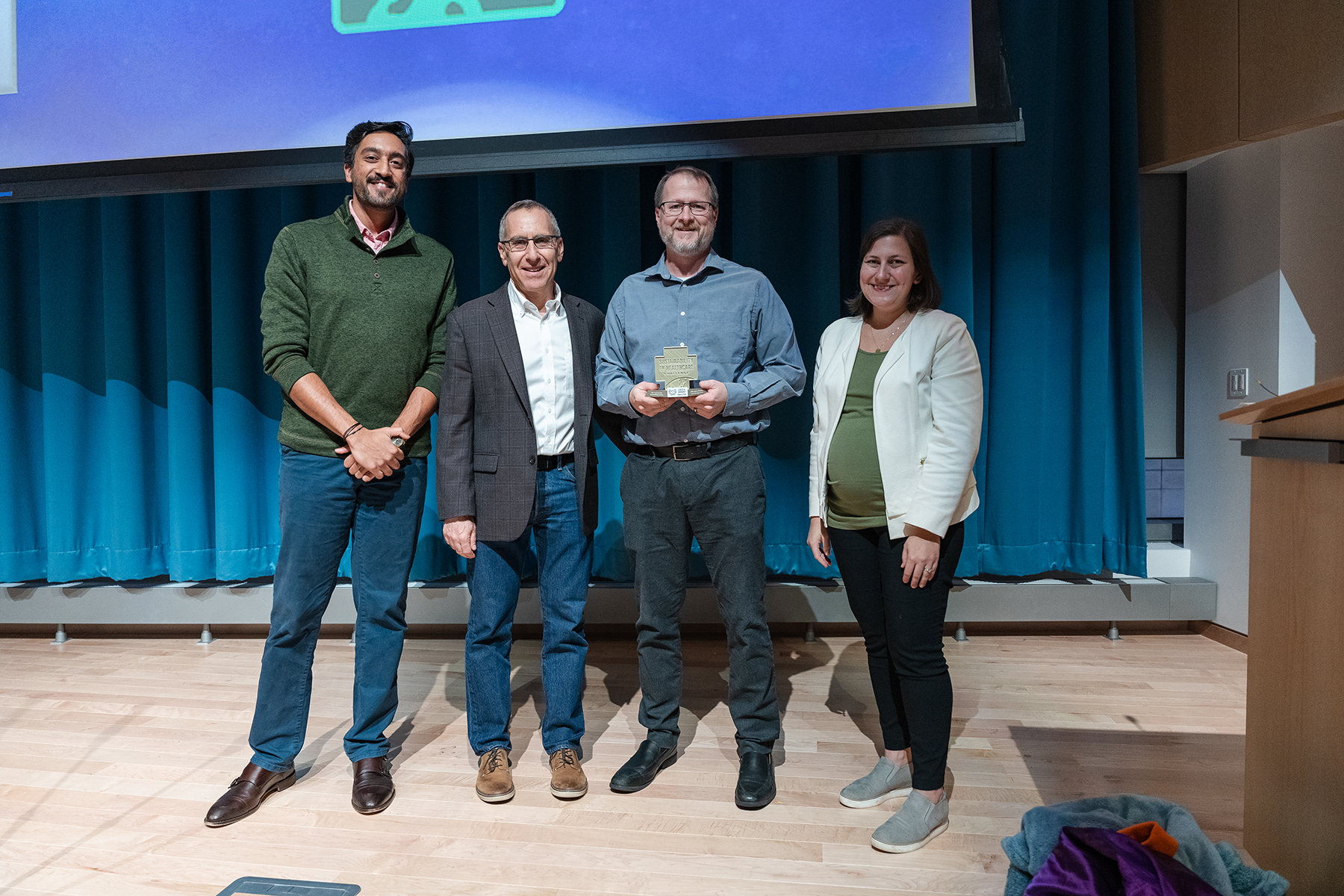
Photographs by Rayni Shiring, University of Pittsburgh
